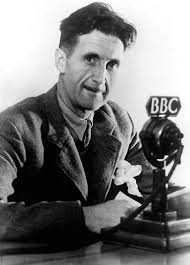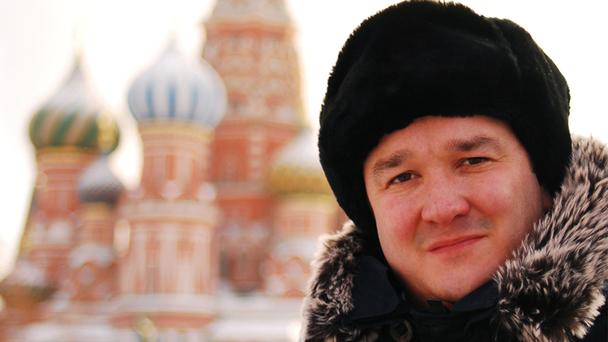The images really do say it all in Strange Days – Cold War Britain. It’s a style of documentary making which puts archive material in first place, ahead even of presenter Dominic Sandbrook, who’s the sole screen presence here (no interviews, no talking heads). We can only wonder exactly how this challenging mêlée of material came together, but can be sure that archive producer Stuart Robertson had every bit as much input as director Rebecca Templar. And we presume that historian Sandbrook was standing over the process, suggesting the tone and nudging the choice and juxtaposition of clips, as well as setting them against music (frequently ironically: the reality of the atomic bomb, with a text, “Every day on the brink of apocalypse” and set against the melody of “Smoke Gets In Your Eyes”).
This first episode of three, “Red Dawn”, could be subtitled, “The Russians are coming!”, though it’s incidences of Soviet soft power rather than brute force that bookend it. Strange Days started with one Russian invasion, that of Moscow’s Dynamo football team in November 1945, and ended a decade later with the Bolshoi ballet’s epoch-making 1956 tour to London. The opening match with Chelsea had thousands turned away from Stamford Bridge (the result, fittingly, was a 3-3 draw), while ballet-lovers queued for days for Covent Garden tickets.
Whether it was advances in space flight, or in kitchen design, that decided the Cold War
This suggests a greater level of popular sympathy among ordinary Britons for the wartime ally whose armies had suffered such catastrophic losses than you might expect from anything we saw in Sandbrook’s film. (The Dynamo players in fact came to London with no hotel rooms reserved and were expected to stay in barracks, and hundreds of Londoners rung in to offer accommodation). On the ideological front, too, it was only the 1956 invasion of Hungary, shown here in parallel with the Bolshoi in London, that saw members of the Communist Party of Great Britain handing in their cards in droves.
Certainly a figure like Hewlett Johnson, the “Red Dean” of Canterbury, seen meeting Stalin (set to “Mad About the Boy”) in 1945 and then receiving the second International Stalin Peace Prize in 1951 (the first had gone to Pablo Picasso, so Johnson was in august company) looks worse than foolish with the hindsight of history. But then – at the risk of repeating the old Soviet habit of answering one accusation from the West with a qualifying riposte – Joseph McCarthy and his House Committee on Un-American Activities, also in evidence in the film, has hardly gone down among posterity’s wise men, either.
 Sandbrook is readier to condemn than praise – though, to paraphrase Winston Churchill, who inevitably featured here with his Fulton speech (introducing us to the phrase “Iron Curtain”), many of those we saw here had a lot to be condemned for. However, even the fleeing spies Guy Burgess and Donald Maclean get a posthumous verdict that they were probably “true believers”, a more generous evaluation than many would accord them. If the accolade of wisdom is granted to anyone, it's to George Orwell (pictured right) who minted the phrase “Cold War”, and in his last days surrendered the names of past associates who he thought could become future enemies of his country.
Sandbrook is readier to condemn than praise – though, to paraphrase Winston Churchill, who inevitably featured here with his Fulton speech (introducing us to the phrase “Iron Curtain”), many of those we saw here had a lot to be condemned for. However, even the fleeing spies Guy Burgess and Donald Maclean get a posthumous verdict that they were probably “true believers”, a more generous evaluation than many would accord them. If the accolade of wisdom is granted to anyone, it's to George Orwell (pictured right) who minted the phrase “Cold War”, and in his last days surrendered the names of past associates who he thought could become future enemies of his country.
Sandbrook’s style is closest to that of the feuilletonist, in the dictionary definition of “usually reflexive, humourous, ironic and above all very subjective in drawing conclusions, assessments and comments”. Next week has him considering whether it was advances in space flight, or in kitchen design, that decided the Cold War. Worth sticking with.















Add comment